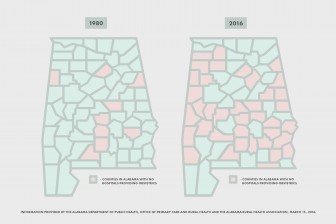An Alternative to Delivering Babies at the Hospital
Alabama has the second-highest infant mortality rate. And more rural hospitals are closing, leaving tens of thousands without convenient access to health care. That includes expectant mothers. A bill to decriminalize midwifery passed in the legislature last year. Now some physicians and nonprofits say for mothers-to-be, birth centers are a way to provide cheaper and safer prenatal care and delivery.
Dr. Jessana Cooper, an ob-gyn at Simon Williams Clinic in Birmingham, says women in Alabama need better access to obstetrical care. Thirty-eight of the state’s rural counties have no hospitals or ob-gyns. Many women drive more than an hour to deliver their babies or get even basic prenatal care. Others just do without. Some women ask their doctors to perform potentially risky caesarian births because they’re scheduled. Cooper says the state needs alternatives.
“A labor and delivery unit is a very expensive way to take care of pregnant women. It’s basically ICU care, for every single pregnant woman regardless of their health, regardless of their risk factor. It’s an expensive way, it’s a high-risk way, and it actually leads to a lot over-intervention that cause can problems later on.”
Cooper advocates setting up birth centers run by certified nurse midwives. These are registered nurses with master’s degrees trained to provide prenatal care and delivery for normal, low risk pregnancies. Women with high risk pregnancies, say mothers with hypertension or diabetes, would be transferred to a hospital.
“It seems a logical solution to our rural health care crisis because it’s less expensive, proven to have good outcomes, and it’s a wellness model,” she says. “As long as you had an integrated system where you could have good transportation, I think it could solve a lot of our troubles.”
Some studies have shown birth centers improved obstetrical care. A 2013 government study looked at 15,000 births across the country. Vanderbilt University’s Margaret Buxton, a certified nurse midwife, says the findings were significant.
“The data is pretty compelling. It lowers preterm birth rate, it lowers infant mortality.”
It does this at a lower cost than hospitals, which have expensive equipment and are staffed around the clock, she says.
In 2015, Vanderbilt partnered with Baby+Co., a company operating birth centers in three states, to open one in Nashville. Most patients have private insurance, while some pay out-of-pocket.
But proponents want birth centers to be affordable to low-income women as well. So Baby+Co. is working with Tennessee’s Medicaid program on a long-term contract to expand birth centers across the state.
“It’s a huge population of women and we really want to be able to offer this full breadth of services to them as well,” says Buxton, who is also clinical director of Nashville’s Baby+Co.
But for that to happen, Medicaid would have to cover birth centers. According to the Kaiser Family Foundation, Medicaid pays for more than 50% of births in Alabama and across the U.S. The state has struggled to fund its Medicaid program.
But some physicians aren’t convinced birth centers will cut down on infant deaths.
“Birthing centers in my opinion are not the answer, to any of this.,” says Dr. Lynda Gilliam, an oby-gyn hospitalist at Huntsville Hospital. “If you’re talking about high risk patients, they’re not going to be birthing center candidates.”
Dealing with the high-risk pregnancies will require long-term, expensive maternal health care. But birth center advocates say it’s safer and cheaper for them to focus on the low-risk, healthy births.
-Haden Holmes Brown
Editor’s note: A previous version of this story incorrectly said a 2013 government study looked at 15,000 birth centers across the country and found they improved obstetrical care. In fact, it was 15,000 births. It also originally identified Vanderbilt University incorrectly as the University of Vanderbilt.
Trump’s harsh immigration tactics are taking a political hit
President Trump's popularity on one of his political strengths is in jeopardy.
A drop in CDC health alerts leaves doctors ‘flying blind’
Doctors and public health officials are concerned about the drop in health alerts from the Centers for Disease Control and Prevention since President Trump returned for a second term.
Photos: Highlights from the Winter Olympics opening ceremony
Athletes from around the world attended the 2026 Winter Olympics opening ceremony in Milan.
Alabama sets execution for man in auto parts store customer’s death
Gov. Kay Ivey on Thursday set a March 12 execution using nitrogen gas for Charles “Sonny” Burton. Burton was convicted as an accomplice in the shooting death of Doug Battle, a customer who was killed during an 1991 robbery of an auto parts store in Talladega.
Trump posts racist meme of the Obamas — then deletes it
Trump's racist post came at the end of a minute-long video promoting conspiracy theories about the 2020 election.
Hyperpop, poetry, BDSM or a Moroccan rave allegory? Choose your own cinematic adventure
Charli xcx is on more screens this weekend while Pillion tells a sweet BDSM story.







